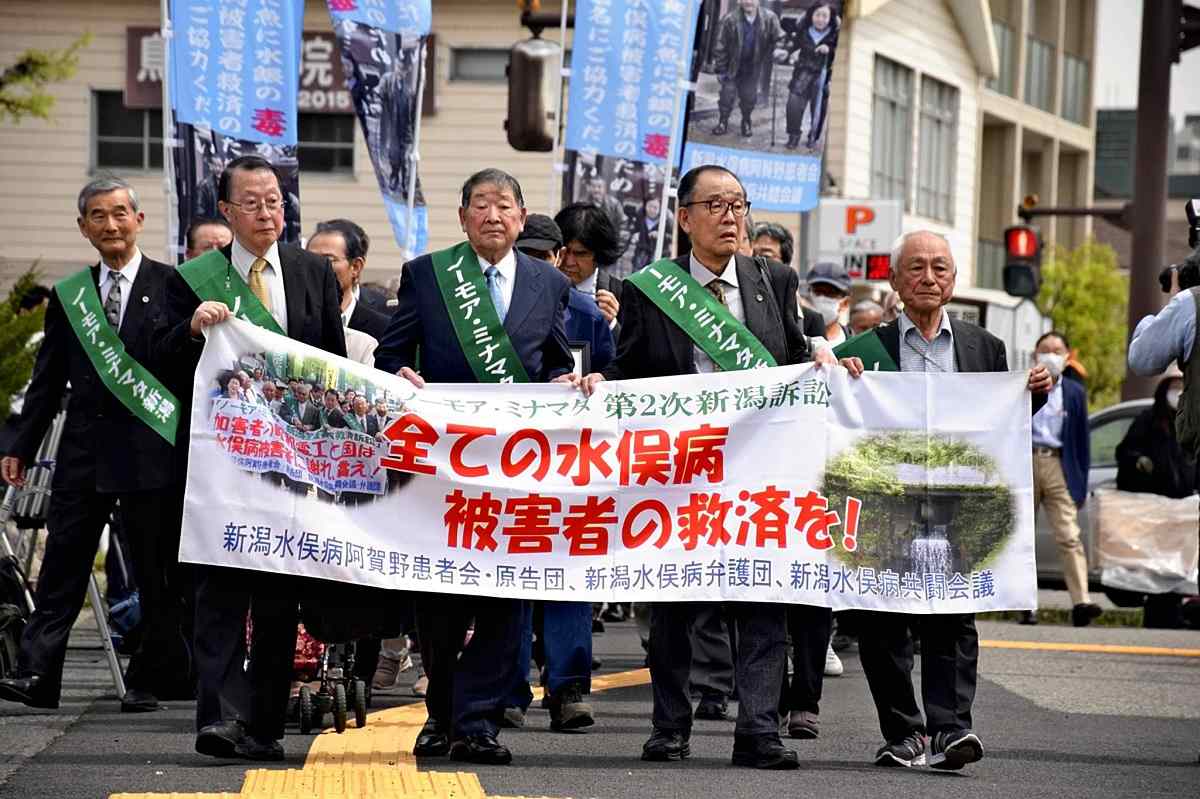
Plaintiffs of Niigata Minamata disease lawsuit are seen heading to Niigata district court in Niigata on Thursday.
10:46 JST, April 19, 2024
Niigata, April 18 (Jiji Press) — A Japanese district court Thursday ordered Resonac Holdings Corp. to pay ¥104 million in damages to people claiming to suffer from Niigata Minamata disease, a neurological disorder caused by mercury poisoning.
At Niigata District Court, Presiding Judge Norio Shimamura ruled that 26 of the 47 plaintiffs in the group lawsuit suffered from Minamata disease linked to methylmercury-tainted wastewater from a plant operated by the chemical maker’s predecessor, Showa Denko K.K., in Niigata Prefecture, central Japan.
The plaintiffs had demanded a total of ¥8.8 million per person in damages, including from the government, after they were excluded from a special relief program.
The judge rejected the claim against the government while ordering Resonac to pay ¥4 million to each of the 26 plaintiffs identified as disease victims. His ruling was read out by another judge Yusuke Suzuki.
Similar lawsuits have been filed at four district courts across the country. This is the third verdict in the series of suits.
The latest ruling is the second to order damages payments, after Osaka District Court recognized all plaintiffs last September as Minamata disease sufferers and ordered that they be compensated.
The government may be prompted to review its relief measures as a result.
The Niigata lawsuit focused on whether the plaintiffs could be deemed as suffering from Minamata disease as a result of eating fish from the prefecture’s Agano River after it was tainted with methylmercury from the Showa Denko plant, and whether the 20-year statute of limitations on damages claims could be applied.
Many residents ate fish from the river even after Niigata Minamata disease was officially recognized in 1965, the ruling said, rejecting the government’s claim that consumption of such fish was avoided following administrative guidance.
The ruling determined that the 26 plaintiffs are highly likely to be suffering from Minamata disease, based on their symptoms and the course of their illness. Meanwhile, the other plaintiffs were not recognized as patients because they had no symptoms that appear to have been caused by methylmercury, according to the ruling.
The plaintiffs had argued that their health damage could have been prevented had the government regulated industrial wastewater.
But the ruling said that the state was not able to specifically recognize or foresee the discharge of organic mercury or the health damage to nearby residents, and that its failure to exercise regulatory authority cannot be deemed illegal.
The ruling said that the application of the statute of limitations should be restricted as patients “faced circumstances that made it difficult to exercise their rights, such as discrimination and prejudice, causing them to hesitate about making claims.”
Last month, Kumamoto District Court recognized some plaintiffs as Minamata disease patients in a similar suit but dismissed their claims on the grounds that the statute of limitations had expired.
About 2,100 people in Niigata had applied for the special relief program for Minamata disease sufferers after the government relaxed the conditions for certifying patients.
But the plaintiffs in the Niigata suit said that the application period, between May 2010 and July 2012, was too short and was closed unilaterally although patients needed time to overcome discrimination and prejudice to apply.
A total of 149 residents around the Agano River have filed lawsuits over Minamata disease since 2013, and the court heard from 47 of them, who are in their 50s to 90s, separately from the other plaintiffs to avoid prolonged proceedings. Hearings for the 47 were concluded last December.
Following the verdict, the Environment Ministry released a statement that it will continue to carefully implement the law on compensation for health damage caused by pollution, enhance local medical and welfare services and work on regional revitalization, reconciliation and promotion.
Top Articles in Society
-

Man Infected with Measles Reportedly Dined at Restaurant in Tokyo Station
-

Man Infected with Measles May Have Come in Contact with Many People in Tokyo, Went to Store, Restaurant Around When Symptoms Emerged
-

Woman with Measles Visited Hospital in Tokyo Multiple Times Before Being Diagnosed with Disease
-

Australian Woman Dies After Mishap on Ski Lift in Nagano Prefecture
-

Foreign Snowboarder in Serious Condition After Hanging in Midair from Chairlift in Nagano Prefecture
JN ACCESS RANKING
-

Japan PM Takaichi’s Cabinet Resigns en Masse
-

Japan Institute to Use Domestic Commercial Optical Lattice Clock to Set Japan Standard Time
-

Israeli Ambassador to Japan Speaks about Japan’s Role in the Reconstruction of Gaza
-

Man Infected with Measles Reportedly Dined at Restaurant in Tokyo Station
-

Videos Plagiarized, Reposted with False Subtitles Claiming ‘Ryukyu Belongs to China’; Anti-China False Information Also Posted in Japan
























